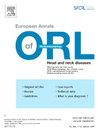对腹腔周围脓肿引流脓液进行细胞细菌学检测对临床实践没有帮助:STROBE 分析。
IF 1.9
4区 医学
Q2 OTORHINOLARYNGOLOGY
European Annals of Otorhinolaryngology-Head and Neck Diseases
Pub Date : 2024-09-01
DOI:10.1016/j.anorl.2024.03.003
引用次数: 0
摘要
目的:腹腔脓肿(PTA)是一种常见病。治疗方法包括引流脓液,同时使用概率性抗生素治疗。对引流脓液进行细胞细菌学检测(CBT)是否有用尚存争议。主要目的是评估 CBT 在 PTA 治疗中的作用。次要目标是确定 PTA 发病的细菌学特征,并根据概率评估细菌对处方抗生素的耐药率:70名门诊患者(33%)和137名住院患者(67%)。100%的患者接受了概率抗生素治疗。对 106 名患者进行了系统的 CBT 检查,结果呈阴性,40% 的病例显示口咽菌群,50% 的病例显示多微生物菌群,10% 的病例显示无菌样本。在 CBT 呈阳性的 101 名患者中,99% 分离出的细菌对青霉素敏感。所有患者都得到了成功治疗。根据细菌学结果,入院时采用的概率抗生素疗法没有任何改变。因此,对于无合并症且入院时无严重体征的患者来说,CBT 是不必要的。本文章由计算机程序翻译,如有差异,请以英文原文为准。
Cytobacteriological testing of drainage pus from peritonsillar abscess is not contributive in clinical practice: A STROBE analysis
Purpose
Peritonsillar abscess (PTA) is a frequent pathology. Treatment consists in drainage of the collection, associated to probabilistic antibiotic therapy. The usefulness of cytobacteriological testing (CBT) of the drainage pus is controversial.
Material and methods
A retrospective study of patients managed for PTA between 2013 and 2020 in our university hospital was performed. The main objective was to assess the usefulness of CBT in the management of PTA. The secondary objectives were to determine the bacteriological profile involved in the onset of PTA and to assess the rate of bacterial resistance to antibiotics prescribed on a probabilistic basis.
Results
The study included 207 patients: 70 outpatients (33%) and 137 inpatients (67%). Probabilistic antibiotic therapy was implemented in 100% of patients. CBT was performed systematically and was negative in 106 patients, revealing oropharyngeal flora in 40% of cases, polymicrobial flora in 50% and sterile samples in 10%. In the 101 patients with positive CBT, the bacteria isolated were penicillin-sensitive in 99%. All patients were successfully treated. In the light of the bacteriological results, no changes were made to the probabilistic antibiotic therapy introduced on admission.
Conclusion
CBT on drainage pus had no impact on the management of PTA. CBT is therefore unnecessary in patients with no comorbidities and no signs of severity at admission.
求助全文
通过发布文献求助,成功后即可免费获取论文全文。
去求助
来源期刊

European Annals of Otorhinolaryngology-Head and Neck Diseases
OTORHINOLARYNGOLOGY-
CiteScore
3.70
自引率
28.00%
发文量
97
审稿时长
12 days
期刊介绍:
European Annals of Oto-rhino-laryngology, Head and Neck diseases heir of one of the oldest otorhinolaryngology journals in Europe is the official organ of the French Society of Otorhinolaryngology (SFORL) and the the International Francophone Society of Otorhinolaryngology (SIFORL). Today six annual issues provide original peer reviewed clinical and research articles, epidemiological studies, new methodological clinical approaches and review articles giving most up-to-date insights in all areas of otology, laryngology rhinology, head and neck surgery. The European Annals also publish the SFORL guidelines and recommendations.The journal is a unique two-armed publication: the European Annals (ANORL) is an English language well referenced online journal (e-only) whereas the Annales Françaises d’ORL (AFORL), mail-order paper and online edition in French language are aimed at the French-speaking community. French language teams must submit their articles in French to the AFORL site.
Federating journal in its field, the European Annals has an Editorial board of experts with international reputation that allow to make an important contribution to communication on new research data and clinical practice by publishing high-quality articles.
 求助内容:
求助内容: 应助结果提醒方式:
应助结果提醒方式:


